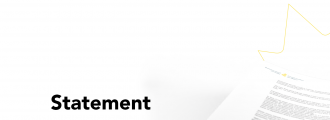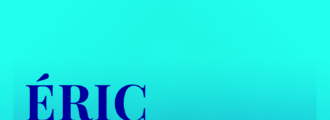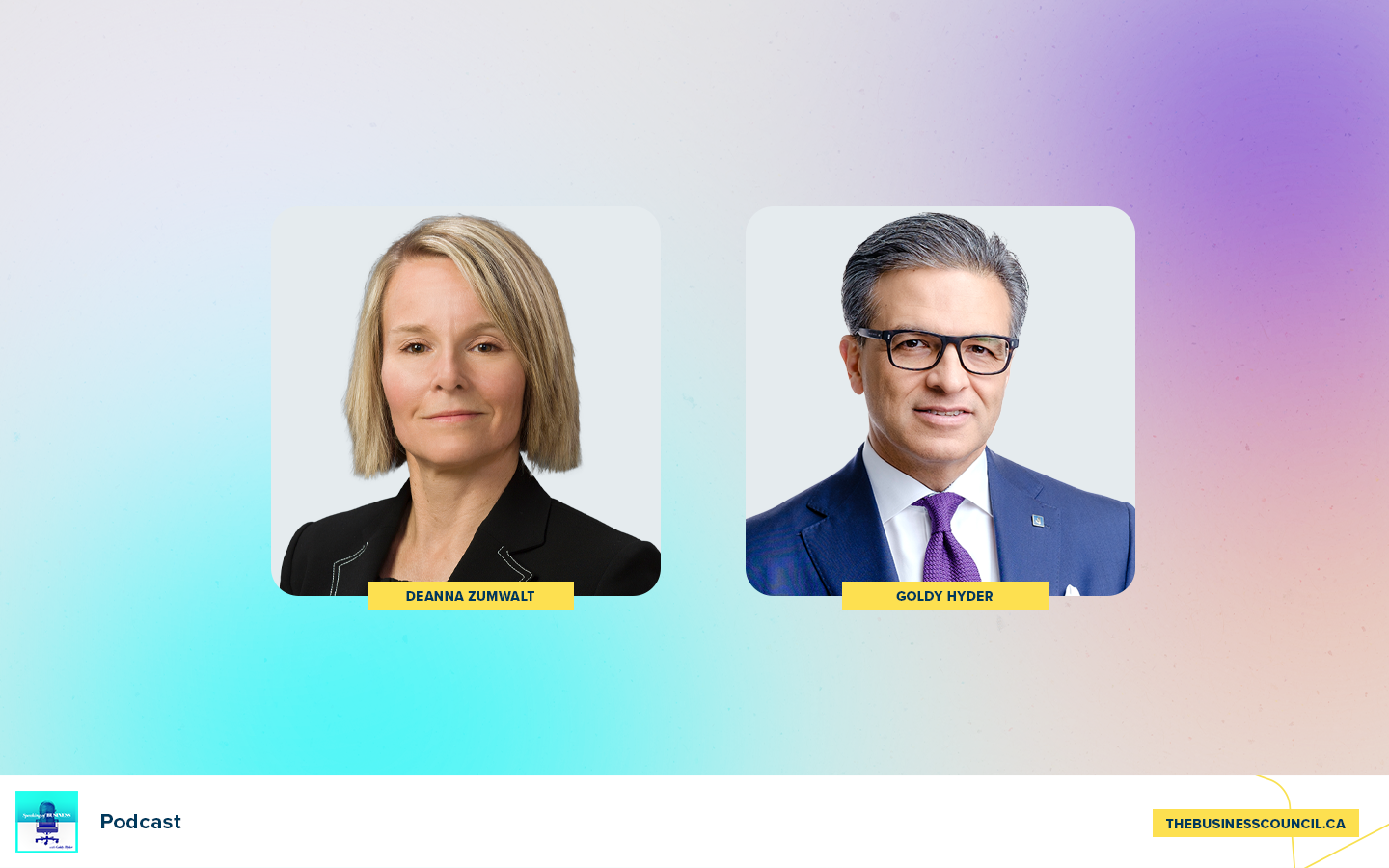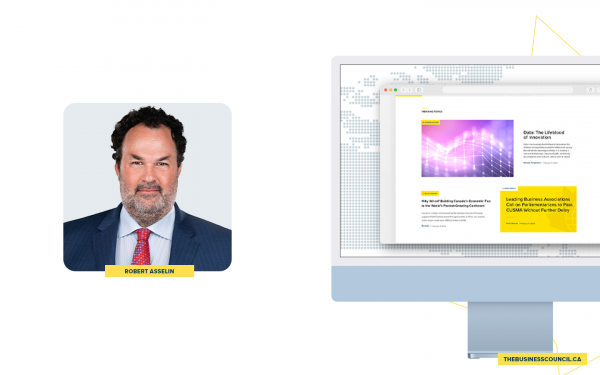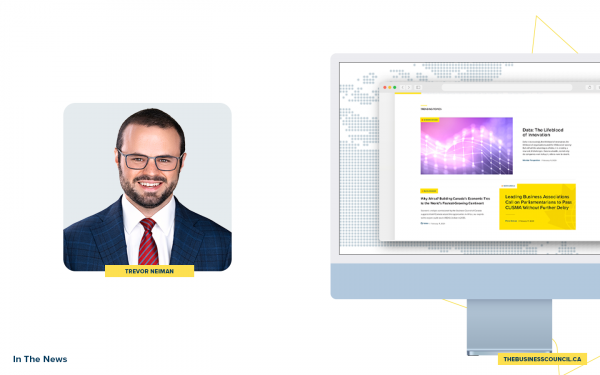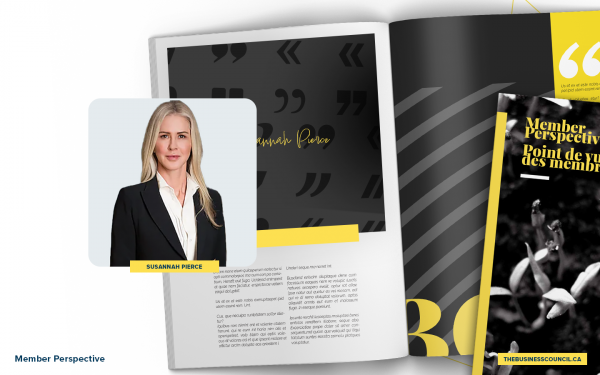Be bold and future-focused: Deanna Zumwalt, Coril Holdings
When Deanna Zumwalt became President and CEO of Coril Holdings in 2021, she took on responsibility for an organization with a rich Canadian legacy. The Calgary-based company, with roots in the railway industry, has evolved considerably since its beginnings nearly 125 years ago. Now Zumwalt is looking ahead to the next century.
“Being a family enterprise for 125 years, we think across generations – we think in 25-year chunks,” she tells Goldy Hyder on the Speaking of Business podcast.
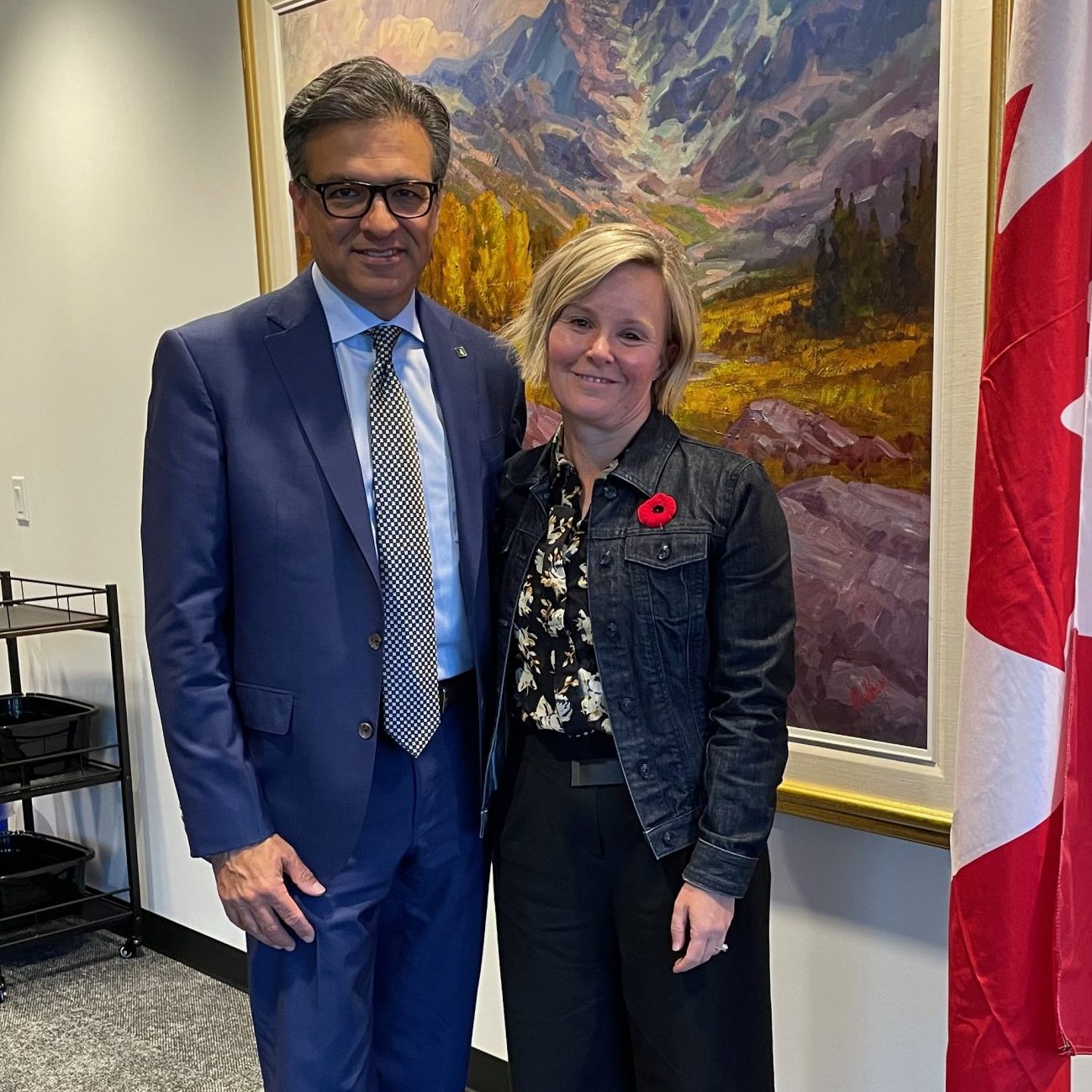
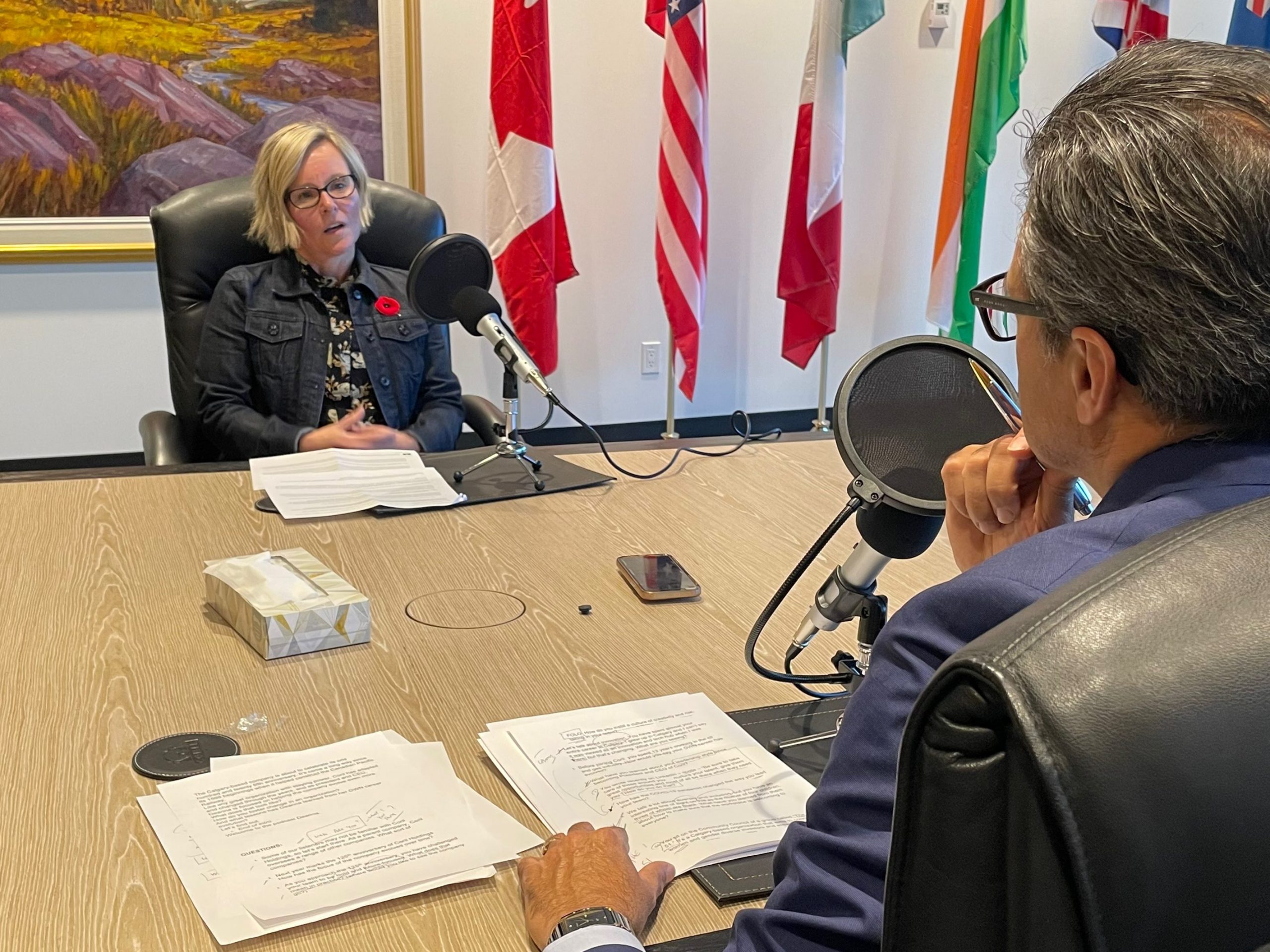
Zumwalt challenges her team to be bold when charting the company’s future. “Whatever we’re doing today, we won’t necessarily be doing in the future. We’ve got to figure out what that future looks like.”
Zumwalt discusses her hopes for her company, the transformation she’s seeing in her hometown of Calgary, and her vision for Canada – one that embraces diversity and difference. She also speaks candidly about the lessons she has learned from her four children, three of whom were adopted from Haiti. “I always say to my children, ‘Listen for, not against.’ Listen for what you believe in. Listen for something that’s in common and then build on that.”
Subscribe
You can find Speaking of Business wherever you get your podcasts.
Latest Podcasts
Transcript
Deanna Zumwalt
I would just love to see Canada embrace its strength. And to me its strength is its diversity and its difference. Unfortunately, we often focus on that difference and focus on what is different instead of what we have in common and then leveraging that difference and that diversity to come up with incredible solutions.
Goldy Hyder
Welcome to Speaking of Business, conversations with Canadian innovators, entrepreneurs, and business leaders. I’m Goldy Hyder, president and CEO of the Business Council of Canada. We are launching season six of the podcast. We’ve got a lot of great guests lined up for this new season, and I’m excited to get started.
Today, we’re in Calgary and are kicking things off with Deanna Zumwalt, president and CEO of Coril Holdings. The Calgary-based company is about to celebrate its 125th anniversary. It’s come a long way since its founding in 1898 when the company helped construct the Canadian Pacific Railway.
Like any other great organization with staying power, Coril has evolved and grown over the years. As president and CEO, Deanna’s focused on ensuring that the company stays flexible so it can adapt to changing markets and new opportunities.
What does that look like in practice though? How do leaders foster change in an organization and what lessons has Deanna learned from her own career evolution? Why don’t we find out? Welcome to the podcast, Deanna.
Deanna Zumwalt
Thanks, Goldy. Looking forward to our conversation.
Goldy Hyder
As am I. Look, I’m home. Calgary, as you know, is my hometown, so it’s always good to be back. There seems to be an energy, if I can say, in the streets here. How you feeling about things where we are? And what is it? The end of October here.
Deanna Zumwalt
Yeah, no, I’m excited. I think you’re right, there is an excitement in the streets in Calgary and it’s not all energy driven for a change. There’s a ton of excitement around the tech ecosystem and there’s just tons of excitement in terms of what’s possible for the city and the province.
Goldy Hyder
I’m going to explore that further but before I go there, you’ve set it up very nicely, actually. Let me just start with, what’s your story? Who are you? Tell our listeners about your journey.
Deanna Zumwalt
My journey is a trained chartered accountant that really built a career that probably wasn’t planned. It was probably more built on a philosophy of I can always go back to what I know but you may never get an opportunity to do something new. And so the result of that is kind of where I am here today.
Always at one point in time thought I would be in accounting. Then I thought I’d always be in energy and now I’m here working for an incredible family enterprise, kind of an iconic family, helping them continue both to build out a legacy, a business like legacy that supports business but also a business like that supports people in the community.
So I consider myself incredibly blessed and I certainly would not be here without really that philosophy of just give it a go.
Goldy Hyder
Give it a go. One of the common themes in this podcast has been a sense of perseverance and a sense of overcoming adversity, and frankly, learning from failures. Your journey been littered with any of those things?
Deanna Zumwalt
Yeah, it has. Probably resilience more than adversity. I do consider myself pretty blessed to have a fantastic career, a supportive community and environment but I would say certainly one of resilience. I would say one where you had to learn to respectfully speak your mind, which helped to build trust, and I think respectfully speak your mind and at times speak truth to power and your true story or reality.
So certainly that’s been a focus probably throughout my career. Probably from the first year I started as an articling student to challenging the partners about the work hours and how we were treated and I can remember people saying, “Oh my gosh, how can you possibly sit down with the partners and say that?” But learning that they wanted to hear. That in many cases people aren’t willing to speak their true reality.
So I think one of resilience, but one of resilience where it’s really speak your story and share it. Don’t assume that people understand your story and I think that’s created a great voice for me and potentially a voice for others as well.
Goldy Hyder
Now we’re all shaped by our experiences and our history. You’ve talked about the professional side, but you’ve got a pretty interesting personal story as well. Take us through your family.
Deanna Zumwalt
So I’ve got a very diverse family, starting certainly with my husband who’s been my greatest supporter and a stay-at-home dad, which is incredibly unusual and certainly that came with challenges for him at times. And then when I look at my children, I have four children. My oldest is a birth child and my youngest three are adopted from Haiti. So certainly the diversity in our family has certainly enriched my perspective and my life, both personally but also professionally for sure.
Goldy Hyder
Now your eldest, we were chatting before we sat down, is serving in the Canadian military in the Navy, thank him for his service. Tell us a little bit about where he is and what he’s doing now.
Deanna Zumwalt
So Mac is currently serving in South Pacific on the HMCS Winnipeg. So I would say he’s right in the heat of not conflict, but certainly tension, and certainly incredibly proud of him and for me as a community and business leader has really shone a light and created understanding of what our young people who choose to serve go through in the military and truly just the importance of the contribution that they’re making.
Goldy Hyder
Our listeners wouldn’t be surprised to know that I’m staring at a very proud mom here for good reason. So that’s the story of the eldest. Now you mentioned the three that are adopted from Haiti. What’s it like for them? What’s it like for you and all this emphasis that’s gone on now around diversity and inclusivity and we went through the Black Lives Matter movement as well. What are you learning from them?
Deanna Zumwalt
So much. I think the biggest thing I’ve learned going through life with the three of them is that bias is real. Bias is real because my view is we don’t take the time to understand other people’s lived reality. We’re always looking at other people through our own lived reality. So I’ve really learned taking the opportunity to understand and hear people’s stories becomes super important.
And when you hear their stories, then taking the opportunity to explore your own bias. The reality is we’re all human beings and human beings all have biases but when you hear that lived reality or story, if you can really dig in and explore your own biases, it becomes super important. I say bias is real because I’ve watched my three children just desperately try to fit in. Desperately try not to stand out and not to be different to the point where they’ll accept really uncomfortable situations-
Goldy Hyder
Such as?
Deanna Zumwalt
And they’ll laugh… A derogatory comment, they’ll accept from either a kid or even teachers. A class exercise that causes them to stand out and they’ll laugh and they’ll say to me, “Mom, it’s okay.” And I’ll say to them, “No, it’s not okay. You have to share your story and embrace your uniqueness and share that because you have to create the opportunity for those individuals to learn.”
I’ve watched them play down in sports. Couple of brilliant athletes and they play down in sports so they don’t stand out alone amongst the other white children.
Goldy Hyder
To fit in.
Deanna Zumwalt
And that was eye opening for me. Certainly, if I didn’t have children of colour, I wouldn’t have seen that. I wouldn’t have experienced that, and I’ve lived that with them. So for me, it’s created a real drive or push, as I would say, a business leader and a community leader to really provide that safe space for people to bring what I call their authentic self to work. To not feel like they’ve got to fit in, to not worry about being judged. Being willing to take a risk and share when they’re uncomfortable and why they’re uncomfortable.
And there’s often really good reasons behind that and I think we can support them at work and create a better environment. Great simple example, we had a young Muslim fellow working with us and we would do these raffles for a donation or a fundraiser and he’s not comfortable with gambling because for him it’s not part of his culture. So no clue. So how could we create opportunities that made him comfortable as well?
So for me, it’s just really shining the spotlight on the fact there is bias. Diversity and inclusion matters so much and it just makes us richer as a business and a community if we acknowledge it and really foster inclusion.
Goldy Hyder
Now I’m a huge This Is Us fan, the whole family. Kids watch this thing at all? Did it resonate with them if they did?
Deanna Zumwalt
Yeah, for sure. Yeah, they’re amazing kids that embrace so many aspects of what I’ll call the traditional North American culture and then the non-traditional North American culture. For me personally, it’s made my life richer. I mean, I’m exploring things that I never would’ve explored if they didn’t allow us to explore those things.
Goldy Hyder
Well look, knowing you, genetic or not, these kids have definitely got some of your drive and determination and that drive and determination has really helped you become successful professionally as well.
So let me pivot if I can to the story of Coril itself. As I mentioned, it’s marking it’s 125th anniversary. It’s a parent company, it oversees a range of other companies. What kind of companies do you oversee? What do people need to know about Coril?
Deanna Zumwalt
Yeah, so I would say Coril, we really like to think of ourselves as an asset manager. So we’re really managing a portfolio of owned businesses but also investments. But I think what makes us unique as an asset manager is we’re always investing with an owner’s mindset and really what I mean by that is we make long-term commitments to good businesses and good people. We don’t trade in and out of assets.
And over that 125 year history, that’s allowed us to do many things from construction to mining to pipelines to energy to hospitality, railway maintenance, so many things. But in terms of today, in terms of the core businesses that Coril is focused in and around, it would certainly be our railway maintenance space and our real estate space and both incredibly exciting spaces to be involved in.
Goldy Hyder
As I mentioned, as you approach your 125th anniversary, you have really challenged your team to be bold and to be future-focused. And obviously you described an asset manager, sometimes those asset managers have a short term view of things versus a longer term view. First of all, what does that mean in practice, be bold and be future-focused? And secondly, where do you see the company’s potential?
Deanna Zumwalt
So be bold and future-focused from my perspective is imperative for us and I would say being bold is in some ways easy for us, in some ways hard for us. I would say it’s hard for us because we have this incredible 125 year legacy.
Goldy Hyder
I was just going to say, a lot of history.
Deanna Zumwalt
We don’t want to mess up, we don’t want to be the ones that mess it up. At the same time, it’s easy for us because we do have a long-term perspective. Being a family enterprise for 125 years, we think across generations, we think in 25 year chunks, we don’t think five years out. So encouraging people to be bold and innovative is easy because whatever we’re doing today, we won’t necessarily be doing in the future. So we got to figure out what that future looks like.
So in terms of where I see us going, I think we will be in different places 25 years from now but I think they will be adjacent to the core businesses we’re in. We’re always looking for adjacencies or opportunities in and around our businesses.
Goldy Hyder
A lot of efficiencies when you can find them, isn’t there?
Deanna Zumwalt
Totally. Whether it’s pushing our geographic boundaries or it’s looking to digitize things, it’s looking to support the tech ecosystem that’s around our businesses. That’s really where our focus is today. So really building off our core and our domain expertise rather than a big step out.
Goldy Hyder
You mentioned geographic boundaries. What do you mean by that? Are you only in Canada or are you in the U.S. as well? Where else are you?
Deanna Zumwalt
No, we’re around the globe. Large presence clearly in the United States and Canada, Mexico. Also Brazil, Australia, Europe, and a growing presence in India. The majority of that presence would be in our railway maintenance business. So we truly do have global reach today.
Goldy Hyder
And what are you seeing out there in terms of the global environment for capital? Global environment for talent? How hard is it to do business? And in your sense, where’s Canada in all of this? How are we competing?
Deanna Zumwalt
Yeah, I would say global business is a challenge. Talent is a challenge everywhere. I would say capital –we don’t seem to have challenge attracting capital into our traditional businesses, that’s not a real challenge. But I would say people and talent and forcing ourselves with 125 year legacy, you can imagine we’re pretty traditional. So forcing ourselves to pivot and maybe be a little less traditional because to attract the workforce of the future, we might have to show up a little bit differently. So really challenging ourselves to do that.
The awesome part is that we have a new generation of family members involved around the board table, so they really can push us, some of us that are a little more traditional, to think and be a little bit different.
Goldy Hyder
You talked earlier about, I’m using this word, but to instill a culture of creativity and risk taking in your team. Obviously we’re coming out of COVID. We’re still finding our way through whatever this return to work phenomena is taking place. How would you do that?
How is it that leaders, whether they’re running large corporations or entities like yours, or small, how do you build culture? Because that’s what I hear the most from people is, “Boy, I want people back not because I don’t trust anybody, I want them back because I have a culture that is award-winning and we can work around.” How are you doing that?
Deanna Zumwalt
So how we’re doing it, I mean, I would say trust is the key to any culture in my mind and trust is the key to operating day to day and trust is the key to figuring out the future. And the reason I say trust is the key is because any one single leader does not have all the answers. They really do need to leverage their team and their talent and those around them. So it’s imperative. I think it was a challenge during COVID for sure because we got disconnected. At the same time, I would say COVID taught me we can work in many different ways and there isn’t just one way of working.
So I would say what we really learned from COVID and applied in our culture is to introduce a little more flexibility and with that flexibility, accountability, but also the trust of that we’re going to give you some flexibility, certainly some boundaries, but we’re going to trust you to use your time appropriately.
And it’s amazing how much engagement that’s created within the team and it’s amazing how that spilled over into the situation where we’re back in the office and working with one another and collaborating. People are so much more open and offering more ideas. So I would say through COVID trust for sure is important. Embracing flexibility but bundling that with accountability, finding time to be together though.
So it’s a little bit of both. You’re hearing people who are saying work from home, it’s the way to go. Return to the office is the only way to go. I would say my philosophy is a combination of the two.
Goldy Hyder
You wrote recently on LinkedIn on this subject, I’m going to quote you here and it says, and I quote, “Be sure to take care of those around you. Nurture your talent, give them great opportunities, and most of all be there when they need you.” How do you do that?
Deanna Zumwalt
So take the time as a leader to build a relationship and I would say a relationship beyond just the business. Sometimes in their career they’re going to need you there and they’re going to need you, I find sometimes, to gently push them. It’s amazing how many incredible young people are capable and bright but they need that gentle push and somebody that believes in them.
So be there to do that but also be there when maybe things aren’t going right in their personal life and maybe something’s hard. Just being there to listen and to help becomes so important. So I think really investing in the relationship is key and then you’ll get so much more out of the working relationship as well.
Goldy Hyder
Let me stick with the leadership theme, that’s a big part of our podcast. We’ve got a lot of young listeners who are all aspiring leaders. It’s often said that a crisis teaches you a lot more about your own leadership than your own. So what did you learn about yourself through COVID and has it in fact changed the way you lead your team or is it just nuance?
Deanna Zumwalt
I think it’s probably more nuance for me. It probably reinforced… You’ve heard me talk about trust and just this mantra of trust. I think we were able to really weather the crisis fairly well because there was trust and relationship there and people weren’t afraid to share what they’re going through, to share their thoughts on how we navigate this crisis together.
So often young leaders feel it’s about proving what they can do. I think for young leaders I would say it’s not so much what you can do, it’s what you can do with others, and how you build team partnership and relationships to really move forward. And so for me, I think if anything, it reinforced the importance of that.
Goldy Hyder
Let me pivot to the area of innovation. So as I mentioned, I’m Calgarian still at heart. How can you not be with the spirit of this place? And having just spent the weekend at a conference in Canmore reminds you just how much you miss the majesty of the Rocky Mountains, let me tell you.
Anyways enough about my missing Calgary, as you can tell. But Calgary has changed. It’s not the Calgary that I grew up in and certainly not the Calgary I left back in 2000. The brand still seems to be very oil and gas-centric but you mentioned earlier innovation. Talk to me about the innovation culture here in Calgary. What is it that people need to know that they don’t appreciate about what’s going on here?
Deanna Zumwalt
I would say the last couple of years we’ve just seen amazing and incredible traction around I would call the innovation and tech ecosystem and I would say it came about because there was kind of a core or strong group of individuals that were resilient and didn’t give up. And they certainly were from a non-traditional industry in this city, they were not oil and gassers.
But what they’ve been able to do through perseverance is create just a strong sense of community around the tech ecosystem that isn’t just the techies anymore. We are seeing people who have been incredibly successful in this city with capital, invest outside their traditional areas. They’re now investing in young founders in areas that might be a stretch for them.
Goldy Hyder
Startups.
Deanna Zumwalt
You bet, and they’re taking the time to mentor and I think we’re just having amazing success. I’m also, it’s kind of hard to think about this, but I’m seeing the city and the province also acknowledge that this is important. It almost feels like there was an aha moment and they kind of got it and they’ve really leaned in.
So I’m seeing a ton of collaboration across groups that wouldn’t typically collaborate to really stand up this tech ecosystem and to me, the proof is in the results of what we’re seeing. We’re seeing young founders move to the city. We’re seeing young founders pick up from the east coast, from Toronto, from Vancouver, and they’re moving their families and they’re moving their teams to Calgary and I think they’re doing that because of that sense of community and there’s that support.
And I think that’s something Calgary’s always been. It’s maybe something that’s been focused a little too much on just one sector but we’re really seeing that expand and I think the result is you’re going to see a city with a lot more diversity and that looks a lot different than it traditionally has, which is to me fantastic.
Goldy Hyder
So where does the energy sector fit into all of that? I mean obviously the brand is about energy. Talk to me a little bit about how you feel that sector is doing and link it, if you will, to the climate change agenda and the need to innovate around that.
Deanna Zumwalt
I’m an individual that grew up in the oil and gas industry. I spent the first 17 years of my career in that. I’ve certainly seen a pivot in the last few years. I would say the industry was a little stubborn and didn’t want to hear the message at one point in time but I think they’ve really embraced what I call the “and,” and that’s we can produce energy and we can do it in a good way.
I love to see that because for the longest time when I was in the industry, it was always about, “Well we got to do this, but… ” And I love the sense of “and.” I think I’m just so incredibly proud of an industry that is getting creative around solutions and I think truly beginning to lead the world in terms of, I’ll say producing energy cleanly. It’s not about clean energy.
Goldy Hyder
We have to believe the leadership has to be from here.
Deanna Zumwalt
100%, and it’s happening. I’m definitely seeing a new generation of leaders that are embracing coming up with solutions together. So I’m incredibly proud to call myself a Calgarian, Albertan, that’s grown up in an energy industry that’s doing things right.
Goldy Hyder
I think by now listeners have figured out my bias. But look, don’t short Calgary, don’t short Alberta, is certainly something I would say. Let me pivot if I can to something else that’s very important to you and that you’re involved in. You sit on a community council of a group called The 51. So you’re going to have to tell me about the name in a minute here, but The 51.
It’s a Calgary based organization that aims to connect women and gender diverse investors and entrepreneurs right across the country. Why do you think an organization like this is important? Tell us a little bit about the organization to begin.
Deanna Zumwalt
So three amazing women created The 51, a venture capital fund, and it’s named The 51 because 51% of the population are women. So that is why-
Goldy Hyder
You may have to rebrand one day.
Deanna Zumwalt
That’s right, maybe. And these three women have created, just to me, what’s an amazing organization. I’m proud to call myself an investor in The 51. I’m proud to be part of the community council and to me, it’s part of the theme you’ve probably heard from me. It’s the idea of supporting inclusion and equal opportunity for groups that haven’t had it in the past.
Whether it’s female founders, whether it’s gender diverse founders, whether it’s minority founders. The reality is and the facts bear it out, they do not have access to the same capital that more traditional founders have. And so this community’s come together to really support those individuals, to shine a light on it. And what boggles my mind is they get a fraction of the capital, these groups, but their returns are always double the returns of their counterparts.
So to me it’s kind of easy. I’m investing in something that’s going to give me a better return but I’m also, I’m helping to support a community that really is about inclusion. Inclusion in capital markets and helping people get access, helping those founders get access to capital that more traditional founders have always had.
Goldy Hyder
Well, terrific. Thank you for your leadership in that. Obviously very important and something clearly you’re very passionate about. Let me conclude, if I may, with the country. You and I are very proud Canadians. We’ve talked about the purpose behind a lot of what we’re trying to do with the Business Council of Canada, about how to make Canada competitive.
What’s your hope for this country? What’s your vision for this country and how is that affecting the advice and guidance and mentorship that you’re giving your kids?
Deanna Zumwalt
Well, you’re going to see a theme here. So I would say as a mother, a business executive and a community leader, I would just love to see Canada embrace its strength. And to me its strength is its diversity and its difference. Unfortunately, we often focus on that difference and focus on what is different instead of what we have in common and then leveraging that difference and that diversity to come up with incredible solutions.
So we don’t listen to one another, we don’t talk, we don’t find the “and.” And I would just love to see less rhetoric, more listening and I would say, I always say to my children, “Listen for, not against.” Listen for what you believe in. Listen for something that’s in common and then build on that.
I would just love to see our political leaders, our business leaders, those in NGOs, just reach out across one another and find the solutions that we need for the future. And those solutions are in our diversity because we have different ideas and we have different thoughts and we’re going to come up with amazing solutions to propel our country forward.
But if we constantly focus on difference and why we don’t want to work together, we’re never going to get there. So that would be my big hope. I don’t have all the answers, but I know we need to work together.
Goldy Hyder
Well look, that’s a great place to end because it’s hopeful. The message is a hopeful one and I’ve always said I sleep well at night because Canadians have time and time again shown me that when you ask them the right questions, they’ll give you the right answers.
There’s a collective wisdom in this country that overcomes and overshadows all that rhetoric, all that social media, all the divisiveness. We’re a smart group of people and that includes people like you. I can’t thank you enough for joining us on this podcast as we kick off season six. It’s a great start and thank you for sharing.
Deanna Zumwalt
Thank you, Goldy.
Goldy Hyder
Deanna Zumwalt is the President and CEO of Coril Holdings.
If you would like to hear more of our Speaking of Business conversations with innovators, leaders and entrepreneurs, why not subscribe to our podcast?
Search for Speaking of Business wherever you get your podcasts.
Or go to our website at the business council dot c-a.
I’m Goldy Hyder. Thanks for joining us.
